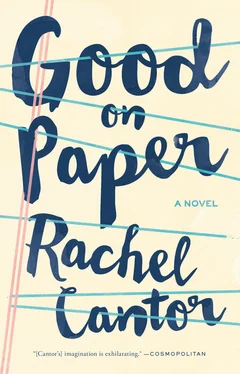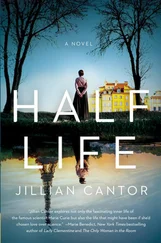Force her to stay, says Efesto, the crippled blacksmith.
Buy her something extravagant, says Hera, the drag queen.
Take her on a second honeymoon, says Mercurio, the travel agent.
Massage her feet, whispers Cytherea, the “comfort woman.” Tell her she’s beautiful.
She knows she’s beautiful, she will not be told what to do, she can go anywhere and get for herself anything she wants — why would she need me? he asks. What can I possibly give her?
What about understanding? Benny says.
But I don’t understand, Romei says.
Exactly! Benny says.
Romei pulls his chair up to the table, does the only thing he knows how to do: he writes. A rambling letter in which he asks Esther to come home: he’ll change, he says, he should be given another chance — but his words sound flat and whiny. He writes a dialogue between them, which quickly becomes a monologue in which Esther berates him for his inattention, his mistaken assumptions, his infernal self-absorption, asks why on earth she would ever want him back. People don’t learn new tricks, she says in English, especially not an old dog like you.
This is not the offering he wishes to make. Esther already knows that he’s an ass. He puts down his pen. How to understand, how to offer understanding?
He picks up his pen.
I am Esther, he writes. I am fifty-five. I am beautiful, but I don’t know it.
He will write her. He will write her skin, her pleasures, her habits and desires. He offers her stories he remembers her telling — about a brick house in Connecticut, a terrier named Sire, a roommate who dated Jack Kerouac — and when he runs out of stories, he interviews ex-lovers, colleagues at the school where she worked. His reputation as an eccentric disposes them to answer his questions: does she give change to the mandolin player; is she popular with the students; what did she do during her lunch hour; does she prefer pistachio or nocciola . He gathers facts, trivial and profound, also the answers to questions he didn’t think to ask: she plays practical jokes, she has nightmares about being trapped in a trolley with no brakes.
Benny helps.
Does she have green eyes or blue? Romei asks.
Brown, Benny says.
She tells of the loss of her family, her anguish, her feelings of impotence, all magnified by Romei, who is so exiled from his own loss that he can’t help her. He writes of the panic she feels during one of her episodes, he tries to imagine what it would be like to have your body turn against you, to suffer ailments you cannot understand, to lose your hair, to awaken with rashes across your face, to be unable to move, so great is your fatigue.
These “first-person” reflections are mixed eventually with third-person views of Esther in New York. He imagines her in Talmud class, describes with loving attention her comments about oxen falling into pits, which detail, tossed off in a line or two, must have required hours of research. He rejoices in the success he imagines for her: the rabbi, stern-faced, pulls his pointed beard and mutters, Excellent, excellent ; Esther flushes with pleasure. She wishes she—
But the section ended here, mid-sentence. Had Romei not sent the ending? Did he win her back? He must have, because there she was, but how? How had he done it?
I sat up on Andi’s bed, took a deep breath. Esther had to have been touched by this effort — it was monumental. She’d be overwhelmed by his devotion, his deep interest in the specifics of her life. She loved him, Benny said; of course she’d give him another chance!
I was rooting for Romei — how had that happened? I found his borrowing of her first person convincing — moving, even: the lover walking in the footsteps of the beloved, demonstrating his willingness to adopt her perspective, wanting to understand. He’d mingled their first-person accounts rather as the woman and man share their stage in the Song —except his first person had become a third person, trailing behind her. As if he didn’t merit a first person, as if self-effacement in service of the beloved was, finally, the point.
I liked Esther, too, now, laughing and learning her way through the City, I admired her bravery, her resourcefulness, I liked Romei for making me like her. She’d come alive, finally, not through praise, or exposure, but through detail and an empathic, imaginative leaping. But where was Romei’s harrowing? Yes, he realizes he’s been a fool, he even takes to his bed in a parody of Dante’s suffering. Unless the harrowing was Esther’s? Maybe now that their points of view had mingled, the story no longer belonged just to him: Your harrowing is my harrowing?
I brought the pages back to the study, where two more awaited me. According to the time and date stamp, they’d arrived a half hour apart — and another was on its way! Romei was writing his pages on the fly, writing a single draft and faxing it to me! Not pausing for breath. What other explanation could there be? Unbelievable — not just because of the cheek involved, but because the writing was so damned good. But why?
Finally, I understood.
Romei wasn’t interested in publication — given what he’d written about his wife, and himself, he’d probably never intended it. He was writing for himself, to help him “cope” with his wife’s illness, so he wouldn’t have to look at her ravaged face. He wasn’t talking to her as she lay sick in bed, he wasn’t holding her hand — he was writing! Given the rush he was in, and the look of her, she was likely dying. Maybe he wanted to give her this testament, this “gift,” before it was too late, translated into her native tongue. She didn’t speak Italian, we knew that already.
With this thought came more understanding, an answer to the question, why me? If Romei didn’t care about publication, if he only wanted a translation he could give his wife, he wouldn’t need a pro. He’d need a competent friend-of-a-friend, someone who’d keep his story in the family, as it were.
Why not be straight with me? Did he think I wouldn’t be interested if fame and fortune were not attached? He didn’t know me — maybe I wouldn’t. Also, from what I could tell, she didn’t have a lot of time. Pros by their nature have places to go, people to see — I was probably the only semi-qualified translator available at a moment’s notice — a translation SuperTemp! Happy coincidence that Benny knew how to find me.
Why all the funny business, then — the images from my stories, the mind-fucks, the bubbles of real life? He must have been trying to keep my interest. Flattering me after a rocky start. He didn’t want to waste time finding a replacement.
Pretty simple, really.

Romei might hope for new life through this unlikely love letter, but for me, there could be no new life without publication. No authors lining up, no Translator’s Note praising the poet. Come Y2K, I’d be back at the prosthetics charity, or its Connecticut equivalent.
I needed to get out of the house. Ahmad had left a message saying he’d pick up Andi after school, so I brought the three new pages to the Eight Bar.
I sat in back where it was quiet and ordered a Hot Fudge Brownie McGee. I might not become famous because of Romei’s gift to Esther but, in Benny’s words, I still wanted to know what happened next.
We are still with Esther in New York. She is sitting with Benny in People of the Book, leaning forward on her folding chair, discussing Midrash. She quotes Rabbi this and Rabbi that, using her imagination to fill in the blanks left by the Author of the Text, who demands that we be partners in creation.
Читать дальше













